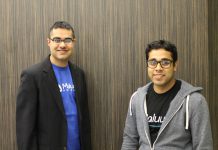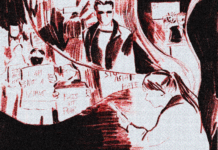UW’s senate voted to recommend to the university’s Board of Governors the regular disclosure of all university investments, the reviewing and cutting of institutional partnership relations based on environmental, social, and governance (ESG) factors, and considering said factors in future investments at a senate special meeting on June 10.
Twenty university senators requested for the special meeting “in response to increasing tensions on campus and in order to discuss concerns raised by students, faculty, and staff, regarding the university’s investments and partnerships with certain institutions.” Throughout the meeting, members of Occupy UWaterloo encampment held a rally outside.
An encampment has been set up on the Grad House Green since May 13 as an appeal to school administrators, with the goal to convince the university to disclose, divest, and boycott companies that are directly involved in fueling the war, entities they describe as “complicit in the Gaza genocide.”
Sarah Ahmed, the media liaison for the encampment, called the vote on the motions a “big win,” stating: “The passage of these motions is a testament to the power of collective activism. We will not stop, and we will not rest until tangible changes are implemented.”
Ahmed also underscored the significance of community involvement, saying, “the students showed up today, they made their voices heard, we were present in the senate room, and the senators, student and faculty showed up and the motions were passed. That is definitely something that we are happy to have some progress on.”
Motions
The three key motions discussed were (pg. 29):
- Investment Disclosure: To recommend that the Board of Governors annually disclose a comprehensive report of all investments and holdings.
- Institutional Partnerships: Senate formally expresses support for the establishment of a defined set of principles and framework to guide approaches to institutional partnerships which are reflective of University of Waterloo values.
- ESG Factors in Investing: To recommend that the Board of Governors include social justice, equity, diversity, inclusion, and international human rights as priority areas in the ESG factors.
All motions were passed with split votes during the meeting. The Board of Governors is set to meet on June 18, where these motions will be further discussed and potentially implemented.
Technion Partnership debate
The partnership with Technion was a focal point of contention. The original motion submitted by students addressed the university’s partnership with Technion, however, the motion that was present for discussion did not include this. Senator James Nugent presented a motion to amend the agenda to add a discussion decision on the original motion that students had put forward. This was voted down, in an interview later, he reiterated that he was “disappointed that his colleagues would not even entertain the discussion.”
There was also contention regarding whether or not deciding partnership was within the scope of the senate’s authority, stating that it was the president who had that authority, not the senate.
Nugent highlighted the significance of addressing specific partnerships like Technion, arguing that the students have presented this issue multiple times and deserve a thorough debate. “We owe it to students, and ourselves, to talk about it. Voting to agree to have an open debate about this is crucial,” he stated.
Senator Neela Hassan emphasized the unique and sensitive nature of the issue, urging the senate to go beyond procedural norms and be open to student demands. “We shouldn’t treat the special meeting as any other topic. This requires a unique response from us,” she said.
Student representative Dvir Zagury stated that to terminate this partnership is based on “far fetched reasonings” and that the motion would harm academic freedom for him and his Jewish peers. He added that research projects between the schools had amassed over $2.5 million in grants.
Faculty member David Simakov, along with Zagury, argued that universities should not be used to promote political agendas, and that doing so would undermine academic freedoms. His belief is that academic boycott requests should be rejected as they would work against the university’s commitment to academic freedom.
Marc Aucoin commented on a potential “slippery slope,” stating: “If we cut ties with Technion, what is stopping us from looking at ties with U.S. (institutions) and what they are involved in?” This sentiment was echoed by several senators, including David Porreca and Murray Gamble who expressed concerns about the broader implications of such a decision.
Vivek Goel, the university president, compared the situation to historical ties with South African universities during apartheid, suggesting that maintaining academic relations can sometimes lead to broader positive outcomes despite political issues. However, this analogy was met with criticism and skepticism from several senators, who questioned its relevance and appropriateness.
James Nugent responded by saying that partnering with institutions is a strategic choice that the university makes, and it is subject to review. “The use of university resources should not be used to promote certain ideologies (in response to comments made by Zagury), but what does it mean for us to stay insitutally neutral in this current context?” Nugent also asked if the university currently has partnerships with Palestinian educational institutions.
Ahmed voiced strong opposition to watering down the motion related to Technion, stating, “Technion is essentially a glorified branch of the Israeli military. The university’s partnership with Technion directly supports the genocide in Gaza.” Ahmed called for the university to act swiftly and decisively, emphasizing the urgency of the matter given the ongoing violence in Gaza.
She later stated, “If this (encampment) is putting pressure on the university to reconsider their other partnerships and alliances, we consider this a win. This is something that the university should be doing, they should be responsible with their students money, they should be responsible with who they’re willing to partner with. And they should be constantly cautious of what morals, what values, what ethics, they are pushing through these partnerships.”
Technion’s relation to the IDF
Technion Israel Institute of Technology has extensive and longstanding ties with the Israeli military as per the memorandum attached to the senate agenda meeting. Key aspects of these affiliations include:
- Senior Management’s Military Backgrounds: Several members of Technion’s senior management have served in the Israeli military. This includes:
- Uri Sivan, President: A former pilot in the Israeli Air Force.
- Boaz Golany, Vice President External Relations and Resource Development: Served in active and reservist units of the Israeli military, retiring as a Lieutenant Colonel.
- Noam Adir, Executive Vice President for Research: Spent three and a half years in the Israeli military and is still an active reserve officer.
- Rafi Aviram, Executive Vice President and Director General: Retired from the IDF with the rank of Colonel and served as Managing Director of Friends of the IDF in the U.S.
- Support for Student Soldiers: Currently, 3,000 Technion students and staff are deployed as part of the Israeli military in “Operation Swords of Iron.” Technion has committed to providing significant material support to these students, including financial assistance, rent exemptions, and academic exemptions.
- Partnerships with Israeli Weapons Manufacturers: Technion collaborates with major Israeli weapons manufacturers like Elbit Systems Ltd. and Rafael Advanced Defense Systems. These partnerships involve research and development of military technologies, including drones, armoured vehicles, and other weaponry.
Furthermore, Technion President Uri Sivan said in an interview with Israel Hayom in February, “Engineers who graduated from the Technion were responsible for the development and production of the armoured vehicles used by the IDF today, as well as all missile defence systems. To this day, 80 per cent of the engineers working on the Iron Dome are our graduates. The microelectronics industry also started here, and this is just a partial list.”
Ahmed concluded her interview by stating, “The students here are as motivated as ever to continue pushing forth our demands. And while we are invigorated by the fact that our demands were discussed in some extent today, we will not stop short of meeting out full demands, we will not settle for half promises, exaggerated timelines, we will only rest when we know that the university has done every single thing that they can to meet our demands and to end their complicity.”































